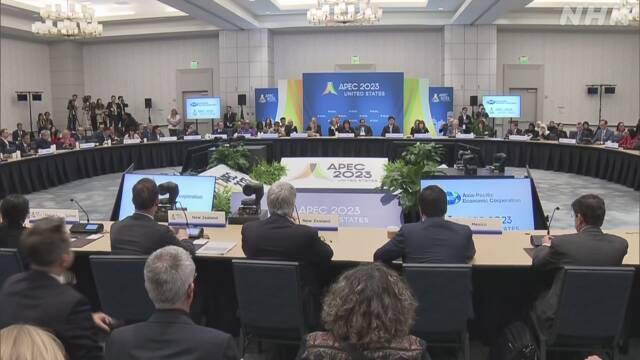The APEC = Asia-Pacific Economic Cooperation Trade Ministers' Meeting began in Detroit, USA, on the 25th. At the G7 Hiroshima Summit, we agreed to strengthen supply chains = supply networks for important minerals, etc., but the focus is on how far we can come up with a unified response at APEC, in which China and Russia participate.
The APEC Trade Ministers' Meeting, which brings together 21 countries and regions surrounding the Pacific Ocean, was attended by METI Minister Nishimura and State Minister for Foreign Affairs Yamada from Japan.
At the meeting, discussions are expected to be held on strengthening supply chains = supply networks such as important minerals and semiconductors, which were major themes at the G7 Hiroshima Summit, responding to climate change issues, and strengthening food security.
Ahead of the meeting, Minister Nishimura stated, "As the world faces major challenges, I would like to firmly assert myself as a Japan, based on the outcomes of the G7 Summit, for free and fair trade and maintaining economic order."
At the beginning of the meeting, U.S. Trade Representative Thailand emphasized the importance of solving problems, saying, "Issues such as fragile supply chains and the worsening climate crisis have been exacerbated by the pandemic and heightened geopolitical tensions."
However, China and Russia are also participating in APEC, and there were a number of cases where the joint statement could not be adopted at last year's ministerial meeting.
Both countries are increasingly opposed to the G7 Hiroshima Summit Leaders' Declaration, and the focus is on how far APEC can come up with a unified response.
APEC's focus is
APEC = Asia-Pacific Economic Cooperation is a regional cooperation framework established in 1989 and includes 21 countries and regions surrounding the Pacific Ocean, including Japan and Southeast Asian countries, the United States, China, and Russia.
At this meeting, a wide range of economic themes will be discussed, such as strengthening supply chains = supply chains, responding to climate change, decarbonization, and strengthening food security.
At the G19 Hiroshima Summit held from 21 to 7 this month, it was confirmed that Japan will strengthen cooperation with emerging and developing countries, also known as the "Global South," by strengthening supply chains such as important minerals and semiconductors, transitioning to clean energy such as solar and offshore wind, and strengthening food security.
For this reason, attention will be paid to whether APEC can find common ground with emerging and developing countries on various issues in the economic field and carry on the outcomes of the Hiroshima Summit.
IPEF's focus is
In addition, on the 27th, after the conclusion of APEC, the IPEF = Indo-Pacific Economic Framework Ministerial Meeting will be held with the participation of 14 countries, including Japan, the United States, and India.
IPEF was proposed by U.S. President Joe Biden as a new framework for economic partnerships with China expanding its economic influence, and the start of consultations was announced in May last year.
In September last year, negotiations were announced in four areas: strengthening supply chains such as semiconductors, facilitating trade using digital technology, developing clean energy technologies, decarbonizing, and preventing corruption.
At this ministerial meeting, the focus is on whether negotiations will progress by strengthening supply chains.
Japan would like to obtain a certain agreement in order to prepare for a situation where the supply of important minerals and semiconductors is interrupted due to infectious diseases or conflicts.
Individual meetings with the United States and China
METI Minister Nishimura, who is visiting the United States to attend a series of ministerial meetings, will hold talks with U.S. Secretary of Commerce Remondo and Chinese Commerce Minister Wang Wentao during the period.
In addition to coordinating with the United States to issue a joint statement on the technological development of advanced semiconductors that Japan aims to domestically produce, it will be interesting to see if they can hold meetings with Chinese ministers to build a stable relationship.

